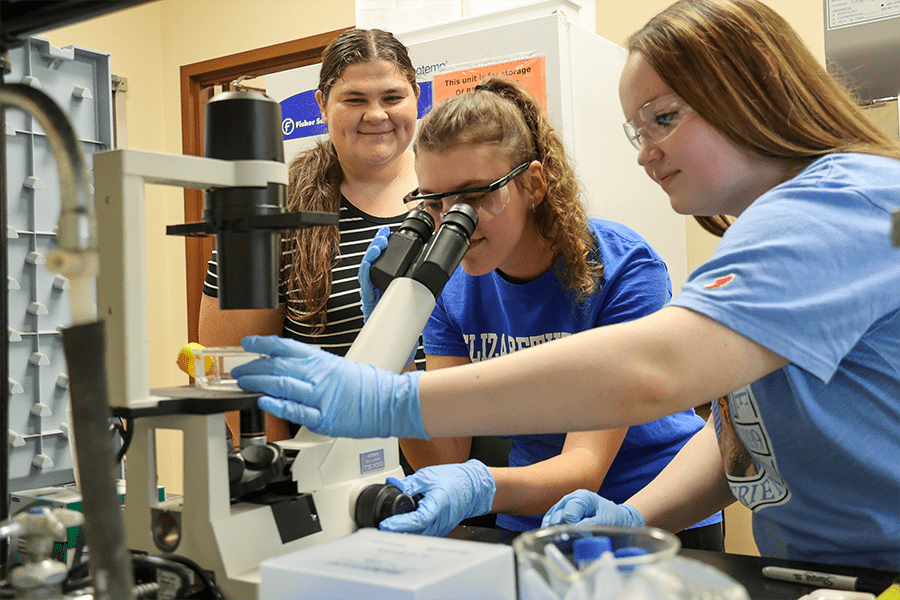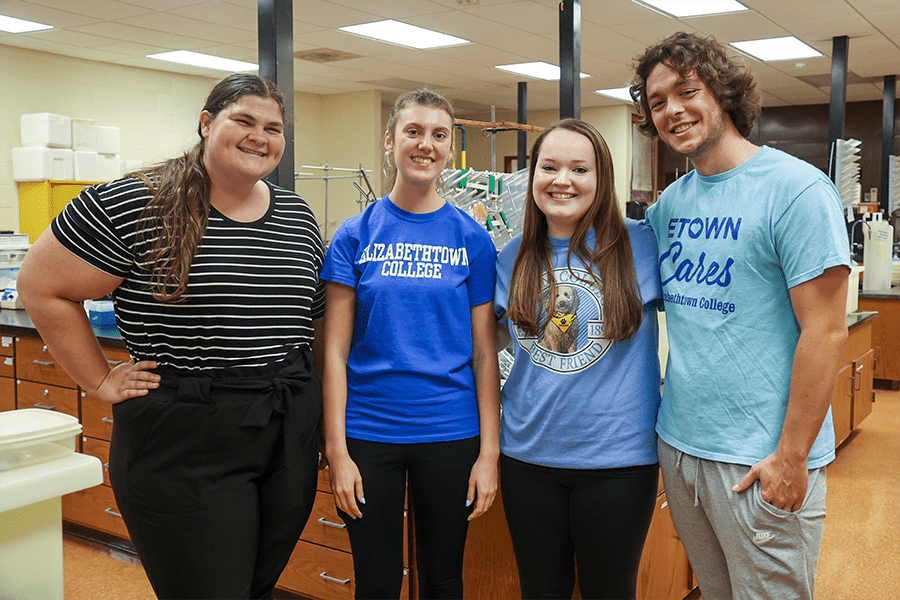Lauren Berger ’25, Emma Caszatt ’26, and Samuel Langer ’25 are hard at work in the Musser labs this summer, aiming to find new approaches to aberrant cell signaling in diseases like asthma as part of the Summer Creative Arts and Research Program (SCARP).
Working alongside faculty mentor Assistant Professor of Chemistry Amy Defnet, the trio of Blue Jays is researching both the causes of disease development from estrogen and heavy metals, as well as potential treatments in the form of kinase inhibitors, which are enzymes that control many important cell functions.
Title of Research
Investigation of Protein Kinases to Determine Therapeutic Targets
Student Researchers
Samuel Langer ’25 (Biology Pre-Medicine major), Lauren Berger ’25 (Biochemistry and Molecular Biology major), and Emma Caszatt ’26 (Biochemistry and Molecular Biology major)
Faculty Mentor
Amy Defnet, Assistant Professor of Chemistry
What are you researching?
Langer: Building off my knowledge from biochemistry class this past academic year, I am characterizing a kinase enzyme with a solved structure but an unknown function. My work involves several biochemical techniques including bioinformatics, protein purification and characterization, and enzyme assays. My work acts as a template for biochemistry labs in the future and a jumping point for future cell-culture projects during my senior year. I am learning to interpret results using appropriate statistical parameters and in the context of what is known about these protein kinases already from the literature.
Caszatt: I am investigating the effects of cadmium chloride on bronchial epithelial cells, and I am also looking into the interactions between the MAPK pathway, specifically AP1, and DNA to further explore the inflammation that is caused by asthma. These experiments are being conducted to learn more about the inflammatory pathways and causes of asthma so that new therapeutic targets and even medications can eventually be developed to treat this disease more effectively.
Berger: For my research, I am investigating the ERK cell signaling pathway to understand what targets to inhibit to stop asthma. This pathway activates the AP-1 transcription factor. I will be transfecting the cDNA of altered genes into bronchial epithelial cells to determine the effects of the specific AP-1 components on the mechanism of inhibition. I will also be experimenting with different levels of estrogen to establish if it is a factor in asthma.
Why did you choose this topic?
Langer: I chose this aspect of research because proteins are an essential part of every living cell. Being able to figure out the function of one of these proteins sounded fascinating and could lead to a better understanding of biological concepts and ourselves.
Caszatt: I chose to study this topic because I am very interested in studying human inflammatory diseases long term, so this is a fantastic experience in the practical and literature aspects of this topic. Ultimately, I want to learn more about inflammatory diseases to treat and diagnose them better.
Berger: I wanted to take all the knowledge I learned in my classes and apply it to something medical. So, when I found out Dr. Defnet was working with asthma I wanted to join. Asthma is a prevalent disease, so understanding how it works and how to stop it will be beneficial.
What was the most interesting aspect of this research?
Langer: I have enjoyed both the experimental and literature aspects of my research. In a short time, I have gained techniques that would take several weeks of lab during the semester to learn. I have gained a better understanding of the interactions and structures of proteins. I have also been trained in several different computer software to aid me in my research. Using technology to help me figure out where to go next has been instrumental in expanding my research.
Caszatt: The most interesting aspect of this research is working with the bronchial epithelial cells and learning troubleshooting techniques when culturing them. Also, the different types of assays we are doing are fascinating and are providing us with a lot of lab experience that we will use in our careers.
Berger: The most interesting part so far is watching the cells grow and doing research on what could impact asthma.
What are you hoping to accomplish through this research project?
Langer: Through this research, I am hoping to discover the function of several proteins and see if they can be potential targets for further research or medical applications.
Caszatt: I am hoping to find some answers concerning the effects of cadmium chloride on the bronchial epithelial cells so that we can better determine the environmental effects on asthma. I also want to learn more about the pathways that I have studied in my other classes and see their interactions in a real-life setting. I also want to use this time to increase my laboratory skills for my future courses and career.
Berger: I hope to gain knowledge and experience in cell biology and to determine if estrogen is a true cause of asthma.
Talk about working with your mentor. How have they helped you throughout this experience?
Langer: Not only has Dr. Defnet provided me with knowledge about our research and biochemistry, but she has been a wonderful person to get to know. She is an excellent person to look up to who is funny and cheerful while also helping me become a better student and person.
Caszatt: Dr. Defnet has helped me immensely throughout this experience. She has explained everything that we have done in great detail, and she has no problem answering any questions that you may have. I have enjoyed working with her and learning her way around the lab, and I hope to work with her again and continue this project!
Berger: My mentor has a positive and patient attitude which creates a great learning environment. She answers my questions and shows me how to use new instruments and techniques.
Hear from the faculty mentor — Amy Defnet
“This is my first summer at Etown and I am so impressed with the dedication and problem-solving skills of the students. Part of science is learning and adapting, and the students I am working with have done a great job thinking about and researching solutions.”

